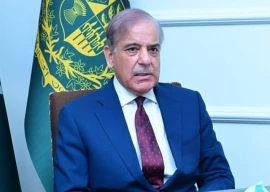
While some celebrated the International Women’s Day on Thursday, others pondered on how to improve the conditions of women in Pakistan. Some took inspiration from role models who have done the seemingly impossible: balance both home and work. Others highlighted how there was still much to be done.
At the National University of Science and Technology (NUST), students celebrated the International Women’s Day by paying tribute to female scientists and professionals, said a press release.
The three guests Dr Bina Shaheen Siddiqui, Dr Asghari Maqsood and Engr Muniba Zaheer engaged in a two-and half-hour discussion with the students.
Dr Siddiqui, who has been awarded 12 patents for anti-cancer constituents and bio-pesticides and has written more than 250 research articles, was asked what inspired her to become a scientist.
She responded, “I was inspired to be a scientist from the very first time I stepped into a laboratory.”
But, she cautioned, “Women have to fight at two fronts: the house and the work place!”
The second guest Dr Maqsood, a professor at NUST, said women can handle both home and work if they get the right support. She admitted that she loves beauty and plants “like any other woman”, but there is no reason to believe that you can’t pursue both your passions and your work simultaneously.
Zaheer, a Senior Pre-Sales Engineer at Alcatel-Lucent Pakistan, said, “Parents don’t tend to encourage daughters to work in the industry. However, without applying what you have learnt there is no point in learning it.”
She added that times have changed and the workplace environment has become a lot friendlier than in the past.
Changing mindsets
In a ceremony in Islamabad, Fiza Batool Gilani, Goodwill Ambassador for Women Empowerment, highlighted the need to change mindsets as a precursor to gender equality.
The journey towards equality begins with mothers themselves, who should not discriminate between their sons and daughters, she said. “Mothers must not give precedence to sons over daughters and both the genders should be treated equally at home,” she said in a statement.
Seven women honoured
Seven women from across the country were acknowledged for their resilience and achievements in a ceremony organised by the Pakistan Poverty Alleviation Fund (PPAF).
These seven women, hailing from PPAF-supported communities across the country, have played a sterling role in not only self-advancement but socio-economic development of their areas, said a press statement.
The women, given the Amtul Raqeeb Award, are: Mehr Nigar (Balochistan), Zeba Gilgit-Baltistan), Zakia Ikram (Khyber-Pakhtunkhwa), Sughra Solangi (Sindh), Rehana Bibi (Islamabad), Najma Shakoor (Azad Jammu & Kashmir) and Nabila Qazi (Punjab).
The award was made in honour of Amtul Raqeeb, a mother of three and Programme Officer at Balochistan Rural Support Programme. She was assigned the task of conducting trainings of the paramedic staff in Mastung and Pishin. She, along with two other colleagues, was shot dead by unidentified assailants on way back to Quetta from Mastung on January 24, 2011.
We can end all violence against women
Students from schools, colleges and universities distributed pamphlets, brochures and flyers under the “We Can End All Violence Against Women Campaign” to spread awareness on violence against women.
The interactive communication material distributed by the campaign volunteers aimed at engaging and educating the public regarding various aspects of social, cultural, and structural violence prevalent in the society, according to a press statement.
The brochures featured an image of a woman, with her hands tied with a ribbon and people had to untie the ribbon to open the brochure. The ribbon symbolised the prevalent violence and discrimination against women and the act of untying the ribbon by individuals meant that everyone was supposed to contribute towards making the society a safe and just place for women.
The We Can Campaign was launched in 2005 to bring about a fundamental change in the societal attitudes towards violence against women.
Students pay tribute to their teachers
In a simple but graceful ceremony, students of the Russian Language Department at National University of Modern Languages paid tribute to their female teachers here on Thursday, said a press release.
Aftab Malik, a student, said that he and his classmates pledged that they would always respect and honour their lady teachers, fellows, colleagues, and other women of the society.
A female student said, “Pakistani women proved their mettle in every field, whether it is teaching, civil services, or the armed forces.”
Published in The Express Tribune, March 9th, 2012.
COMMENTS (1)
Comments are moderated and generally will be posted if they are on-topic and not abusive.
For more information, please see our Comments FAQ
























































There is a silent social revolution taking place with rising number of women joining the workforce and moving up the corporate ladder in Pakistan.
Women now make up 4.6% of board members of Pakistani companies, a tad lower than the 4.7% average in emerging Asia, but higher than 1% in South Korea, 4.1% in India and Indonesia, and 4.2% in Malaysia, according to a February 2011 report on women in the boardrooms. Female employment at KFC in Pakistan has risen 125 percent in the past five years, according to a report in the NY Times. The number of women working at McDonald’s restaurants and the supermarket behemoth Makro has quadrupled since 2006.
http://www.riazhaq.com/2011/09/working-women-seeding-silent-social.html